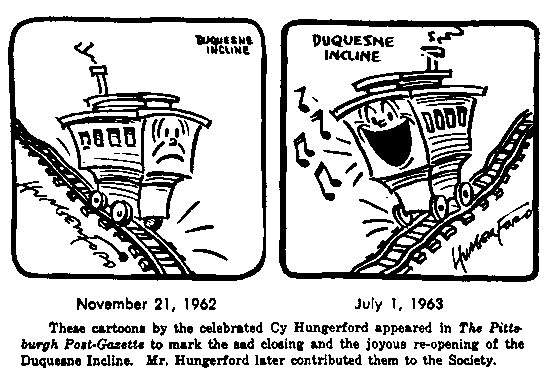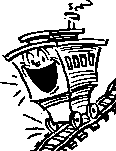

But the residents of the Duquesne Heights section of Mount Washington, stunned by the sudden loss of a facility they had long taken for granted, decided to make an effort to save this relic of Pittsburgh's early history and still, for them, the quickest route to Downtown Pittsburgh. A small group of men representing the community, headed by Mr. David Miller, met with the Incline owners and established a working agreement whereby the neighborhood would launch a fund-raising drive and the owners would consent to the repairing and re-opening of the Incline if sufficient money was forthcoming.
To raise $15,000 in a small community of average means, in the middle of the Winter season, concurrent with several other charitable fund drives surely indicates dedication and enthusiasm on the part of the residents. It was truly a community effort; Boy Scouts distributed information flyers produced by Virginia Peden, a columnist for the Mount Washington News, to every family. Later there was more advertising, including the production of pamphlets. Smaller boys counted and bundled the One Dollar Souvenir Tickets which the women of the community sold from door-to-door. Shares of stock in The Duquesne Inclined Plane Company were sold for one hundred dollars, each. There were bake sales and card parties, and as the fund grew the men of the neighborhood began to make minor repairs and to clean and paint the cars and the station houses. At the end of six months the necessary money had been raised, the new sheaves installed, and on July 1, 1963, The Duquesne Incline was triumphantly re-opened to a jubilant community.
Since that time the support of the Mount Washington community, as well as the City of Pittsburgh and the entire metropolitan area, has kept he Incline in operation, with the generous help of the news and advertising media of the area. Shortly after its reopening, the Incline was purchased by the Port Authority of Allegheny County. The Second Class County Port Authority Act of 1959 legally empowered and required the Authority to purchase all forms of mass transportation in Allegheny County and consolidate them into a publicly-sponsored, county-wide public transportation system. The companies acquired in 1964 were one trolley, bus, and incline company, Pittsburgh Railways, which had been operating the Castle Shannon Incline, with a Lower Station at the corner of East Carson Street and Arlington Avenue, until 1964; two inclined plane companies, The Duquesne and Monongahela inclines; and thirty bus companies. Under private ownership, these transit lines had provided public transportation services to the residents of Allegheny County for most of the twentieth century, under various degrees of financial difficulty. The consolidated transit system, named Port Authority Transit (PAT), began operation on March 1, 1964.
Instead of closing The Duquesne Incline, which as yet could not be operated economically as part of the transit system, the Port Authority graciously leased the Incline to its rescuers for one dollar a year(which, each year after receipt of the lease fee, PAT promptly returns as a donation to The Duquesne Incline).
The Society for the Preservation of the Duquesne Heights Incline was formed, in 1964, from the temporary neighborhood committee which rescued the Incline in 1963. Today, the Society assumes full responsibility for operating and maintaining the Incline as a non-profit enterprise. Its officers provide daily supervision and overall direction on a volunteer basis; only the operators, conductors, and a small staff of maintenance personnel are on the payroll. Contributions are many and varied, ranging from Westinghouses' donation of $20,000(in 1972) to the receipts of the donation box in the Upper Station Waiting Room.
Visitors from all over the world have been added to the regular flow of commuter traffic. Summer and Winter, travelers come to absorb the spectacular view of Pittsburgh and to see in The Duquesne Incline a feature of the past which is very old, yet basically practical and durable. Visitors account for more than half of the Incline rides each year, and thus, contribute in a large measure to its preservation and restoration.
Much work has been done to restore and rehabilitate the entire operation. The interior of the Incline cars has been stripped of gray paint to reveal the original hand-carved cherry panels trimmed with oak and birdseye maple. The transoms have some of the original amber glass. Much time has also been devoted to the Waiting Rooms, the cable and motor rooms, and to track maintenance and idler replacement.
In 1987, contributions from major foundations, as well as the general public, made it possible to replace the ancient tar-paper roof over the cable room and shop with a sturdy concrete slab. This provides a large, handsome Observation Deck offering the most spectacular view of Pittsburgh's Central Business District, affectionately known as "The Golden Triangle;" much of the rest of the city, as well as some nearby suburban areas, can also be viewed from this summit. Two binocular telescopes, for public use on the Observation Deck, assist with the view of the city and environs.
In addition, a small wing was added to house administrative offices and an enlarged gift shop, as well as a small extension of the Upper Station's museum gallery. Income from the sale of souvenirs has been most important in providing funds for the Incline's capital-improvement program.
The Duquesne Incline received a visit from two of the world's leaders on February 24, 1994. On that day, the Incline hosted William Jefferson Clinton, President of the United States of America, and John Major, Prime Minister of the United Kingdom. At the invitation of President Clinton, Prime Minister Major was in Pittsburgh to visit the area where his father lived as a young man. After riding the Incline, the two leaders had a "boys' night out" at the nearby Tin Angel Restaurant.

Facts and Figures Regarding The Duquesne Incline
Samuel Diescher, Builder of The Duquesne
Incline
Chronology of Pittsburgh Inclines
Observation Deck, with Beautiful Downtown View
Airport Busway Project and Proposed Duquesne Incline Station
From the Pittsburgh Tribune-Review, June 1, 1997:
The incline
builders: Forgotten engineers of Pittsburgh
From the Pittsburgh City Paper, April 29, 1998:
You Had to Ask: After Closing of the Troy Hill
Incline
History of Andrew Carnegie and Carnegie Libraries
Return to History Cover Page
Return to Public Transportation
Return to Directions/Free Parking